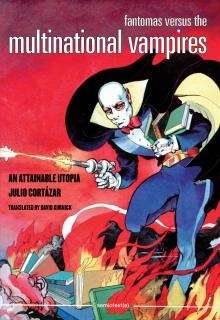Fantomas versus the Multinational Vampires

Editorial MIT Press
Fecha de edición agosto 2014 · Edición nº 1
Idioma inglés
Traducción de Kurnick, David
EAN 9781584351344
88 páginas
Libro
encuadernado en tapa blanda
Resumen del libro
First published in Spanish in 1975 and previously untranslated, Fantomas versus the Multinational Vampires is Julio Cortázar's genre-jumping mash-up of his participation in the Second Russell Tribunal on human rights abuses in Latin America and his cameo appearance in issue number 201 of the Mexican comic book series Fantomas: The Elegant Menace. With his characteristic narrative inventiveness, Cortázar offers a quixotic meta-comic/novella that challenges not only the form of the novel but its political weight in contemporary cultural life.
Needing something to read on the train from Brussels (where he had attended the ineffectual tribunal meeting), our hero (Julio Cortázar) picks up the latest issue of the Fantomas comic. He grows increasingly absorbed by the comic book's tale of bibliocide (a sinister bibliophobic plot to obliterate every book from the archives of humanity), especially when he sees the character Fantomas embark upon a series of telephone conversations with literary figures, starting with The Great Argentine Writer himself, Julio Cortázar (and also including Octavio Paz and a tough-talking Susan Sontag). Soon, Cortázar begins to erase the thin line between real-life atrocities and fictional mayhem in an attempt to bring attention to the human rights violations taking place with impunity in the country from which he was exiled.
Biografía del autor
x{0026}lt;P x{0026}lt;B Julio Cortázarx{0026}lt;/B x{0026}lt;BR Nacido en Bruselas en 1914, durante una estancia temporal de sus padres en esa ciudad, es uno de los escritores argentinos más importantes de todos los tiempos. Realizó estudios de Letras y de Magisterio, y trabajó como docente en varias ciudades del interior de Argentina. En 1951 fijó su residencia definitiva en París, desde donde desarrolló una obra literaria única dentro de la lengua castellana. Algunos de sus cuentos se encuentran entre los más perfectos del género. x{0026}lt;I Rayuela x{0026}lt;/I conmocionó el panorama cultural de su tiempo y marcó un hito insoslayable dentro de la narrativa contemporánea. Cortázar murió en París en 1984.x{0026}lt;/P








